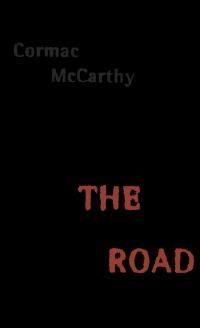 A father and his son travel south in a post- apocalyptic future seeking safer and warmer climes in Cormac McCarthy’s remarkable new novel The Road. They travel by roads, guided by an old, weathered map, avoiding wandering clans of cannibalistic “bad guys” in the words of the child. They’re armed with a pistol with two shots left and meager provisions stuffed into two knapsacks and a shopping cart.
A father and his son travel south in a post- apocalyptic future seeking safer and warmer climes in Cormac McCarthy’s remarkable new novel The Road. They travel by roads, guided by an old, weathered map, avoiding wandering clans of cannibalistic “bad guys” in the words of the child. They’re armed with a pistol with two shots left and meager provisions stuffed into two knapsacks and a shopping cart.The journey story is not new territory for McCarthy. From the Kid in Blood Meridian to John Grady Cole and Lacey Rawlins in All The Pretty Horses to Billy Parnham in The Crossing, it’s been the journey that has defined much of his best work. The father in The Road shares the same sense of duty and responsibility as these others. Though the hardships of each are singular and unique.
Many scenes of The Road contain abject terror as when the pair encounter these “bad guys.” The ruthlessness of the actions is coiled within compact paragraphs of stunning depth and matter-of-factness. The absence of psychological insight into why some choose to embrace evil while others choose not to only adds to the fear and dread. This same refusal to look inside a man’s capacity for evil is what makes the Judge in Blood Meridian so terrifying a presence.
Other passages serve as a placid travelogue of how they spent their days. The description of their provisions or of the fixing the wagon or of cleaning the clothes are so mundane that they are rendered beautiful because of the gray canvas of the world in which they inhabit. The story is episodic and straightforward. Days turn to night. Miles disappear behind them. They hunger. They find ways to cope with the cold.
The gentleness and the patience of the father in the face of such hardship is a test of endurance. The father and son share a can of coke rescued from an upturned soda machine. They ride the wagon down a slope into the wind. The father marvels at the child’s turn of a phrase. Where’d you learn that, he asks.
There is heft to the words here - this is Cormac McCarthy after all – but it doesn’t plum the depths that his previous work does. Whereas in Blood Meridian or the Border Trilogy, the world was in a transformative state, wilderness was tamed, and the industrial age was in ascension, the world of The Road has been transformed in finality. The reason for what happened to the world remains unsaid. The relics of the old world remain to be burned or pillaged. But no new system is ready to replace it. The battleship gray sky that blots out the sun, the gray ash that whirls in the winds: these are the new known world. The child was born after the transformation. This is the only world the child knows. And it is, perhaps, in that knowing where the hope of the novel lies.
No comments:
Post a Comment